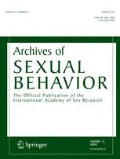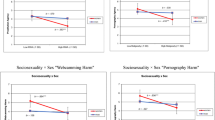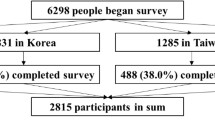Abstract
Bisexual individuals experience unique discrimination related to their sexual orientation, which may increase their risk of adverse health outcomes. The study goal was to investigate how bisexual and other non-monosexual individuals experience discrimination, understand how they perceive discrimination to affect their health, and examine the ways in which they cope with discrimination by analyzing responses to open-ended survey questions. The sample included 442 bisexual and other non-monosexual adults, ages 18–68 years (M = 28.97, SD = 10.30), who either reported a bisexual identity or reported attractions to more than one gender. Gender identities included women (n = 347), men (n = 42), and transgender/non-binary individuals (n = 53); 29% of participants were currently located outside of the U.S. Participants completed an online survey, including three open-ended questions regarding their experiences with discrimination, how discrimination affects their health, and methods used to cope with discrimination. Themes related to perceived discrimination included: double discrimination of bisexuals and other non-monosexual individuals by heterosexuals, lesbian and gay individuals; bisexual invalidation and erasure; and sexual victimization. Themes related to the perceived effects of discrimination on health included: impact on mental health; impact on physical health; and effect of discrimination in healthcare. Themes related to coping with discrimination included: social support; resilience; and identity-specific media consumption. Findings demonstrate that bisexual and other non-monosexual individuals’ experiences of discrimination can be additive, based on other marginalized facets of identity, including race/ethnicity, gender, and socioeconomic status. Our findings have implications for advancing bisexual health research from an intersectionality framework.
Similar content being viewed by others
References
Baams, L., Grossman, A. H., & Russell, S. T. (2015). Minority stress and mechanisms of risk for depression and suicidal ideation among lesbian, gay, and bisexual youth. Developmental Psychology, 51, 688–696. https://doi.org/10.1037/a0038994.
Balsam, K. F., Molina, Y., Beadnell, B., Simoni, J., & Walters, K. (2011). Measuring multiple minority stress: The LGBT people of color microaggressions scale. Cultural Diversity & Ethnic Minority Psychology, 17, 163–174. https://doi.org/10.1037/a0023244.
Barker, M., Bowes-Catton, H., Iantaffi, A., Cassidy, A., & Brewer, L. (2008). British bisexuality: A snapshot of bisexual representations and identities in the United Kingdom. Journal of Bisexuality, 8, 141–162. https://doi.org/10.1080/15299710802143026.
Borkan, J. (1999). Immersion/crystallization. In B. F. Crabtree & W. L. Miller (Eds.), Doing qualitative research (pp. 179–194). Thousand Oaks, CA: Sage.
Bostwick, W., & Hequembourg, A. (2014). ‘Just a little hint’: bisexual-specific microaggressions and their connection to epistemic injustices. Culture, Health & Sexuality, 16, 488–503. https://doi.org/10.1080/13691058.2014.889754.
Bostwick, W. B., Hughes, T. L., & Everett, B. (2015). Health behavior, status, and outcomes among a community-based sample of lesbian and bisexual women. LGBT Health, 2, 121–126. https://doi.org/10.1089/lgbt.2014.0074.
Bower, J., Gurevich, M., & Mathieson, C. (2002). (Con) tested identities: Bisexual women reorient sexuality. Journal of Bisexuality, 2, 23–52. https://doi.org/10.1300/j159v02n02_03.
Bowleg, L. (2012). The problem with the phrase women and minorities: Intersectionality—An important theoretical framework for public health. American Journal of Public Health, 102, 1267–1273. https://doi.org/10.2105/ajph.2012.300750.
Bradford, M. (2004). The bisexual experience: Living in a dichotomous culture. Journal of Bisexuality, 4, 7–23. https://doi.org/10.1300/j159v04n01_02.
Brewster, M. E., & Moradi, B. (2010). Perceived experiences of anti- bisexual prejudice: Instrument development and evaluation. Journal of Counseling Psychology, 57, 451–468. https://doi.org/10.1037/a0021116.
Brooks, V. R. (1981). Minority stress and lesbian women. Lexington, MA: Lexington Books.
Callis, A. (2013). The black sheep of the pink flock: Labels, stigma, and bisexual identity. Journal of Bisexuality, 13, 82–105. https://doi.org/10.1080/15299716.2013.755730.
Case, P., Austin, S. B., Hunter, D. J., Manson, J. E., Malspeis, S., Willett, W. C., & Spiegelman, D. (2004). Sexual orientation, health risk factors, and physical functioning in the Nurses’ Health Study II. Journal of Women’s Health, 13, 1033–1047. https://doi.org/10.1089/jwh.2004.13.1033.
Cochran, S. D., & Mays, V. M. (2007). Physical health complaints among lesbians, gay men, and bisexual and homosexually experienced heterosexual individuals: Results from the California Quality of Life Survey. Journal of Public Health, 97, 2048–2055. https://doi.org/10.2105/ajph.2006.087254.
Conron, K. J., Mimiaga, M. J., & Landers, S. J. (2010). A population-based study of sexual orientation identity and gender differences in adult health. American Journal of Public Health, 100, 1953–1960. https://doi.org/10.2105/AJPH.2009.174169.
Crabtree, B. J., & Miller, W. L. (1999). Using codes and code manuals: A template organizing style of interpretation. In B. F. Crabtree & W. L. Miller (Eds.), Doing qualitative research (pp. 163–177). Thousand Oaks, CA: Sage.
Crenshaw, K. (1991). Mapping the margins: Intersectionality, identity politics, and violence against women of color. Stanford Law Review, 43, 1241–1299. https://doi.org/10.2307/1229039.
de Bruin, K., & Arndt, M. (2010). Attitudes toward bisexual men and women in a university context: Relations with race, gender, knowing a bisexual man or woman, and sexual orientation. Journal of Bisexuality, 10, 233–252. https://doi.org/10.1080/15299716.2010.500955.
Ebin, J. (2012). Why bisexual health? Journal of Bisexuality, 12, 168–177. https://doi.org/10.1080/15299716.2012.674854.
Farajajé-Jones, E. (1995). Fluid desire: Race, HIV/AIDS, and bisexual politics. In N. Tucker, L. Highleyman, & R. Kaplan (Eds.), Bisexual politics: Theories, queries, and visions (pp. 119–130). New York: Harrington Park Press.
Feinstein, B. A., Dyar, C., Bhatia, V., Latack, J. A., & Davila, J. (2014). Willingness to engage in romantic and sexual activities with bisexual partners: Gender and sexual orientation differences. Psychology of Sexual Orientation and Gender Diversity, 1, 255–262. https://doi.org/10.1037/sgd0000047.
Flanders, C. E., Robinson, M., Legge, M. M., & Tarasoff, L. A. (2016). Negative identity experiences of bisexual and other non-monosexual people: A qualitative report. Journal of Gay & Lesbian Mental Health, 20, 152–172.
Friedman, M. R., Dodge, B., Schick, V., Herbenick, D., Hubach, R. D., Bowling, J., & Krier, S. (2014). From bias to bisexual health disparities: Attitudes toward bisexual men and women in the United States. LGBT Health, 2, 1–10. https://doi.org/10.1089/lgbt.2014.0005.
Frost, D. M., Lehavot, K., & Meyer, I. H. (2015). Minority stress and physical health among sexual minority individuals. Journal of Behavioral Medicine, 38, 1–8. https://doi.org/10.1007/s10865-013-9523-8.
Hatzenbuehler, M. L. (2009). How does sexual minority stigma “get under the skin”? A psychological mediation framework. Psychological Bulletin, 135, 707–730. https://doi.org/10.1037/a0016441.
Herbenick, D., Reece, M., Schick, V., Sanders, S. A., Dodge, B., & Fortenberry, J. D. (2010). Sexual behavior in the United States: Results from a national probability sample of men and women ages 14–94. Journal of Sexual Medicine, 7(Suppl 5), 255–265. https://doi.org/10.1111/j.1743-6109.2010.02012.x.
Hequembourg, A. L., Livingston, J. A., & Parks, K. A. (2013). Sexual victimization and associated risks among lesbian and bisexual women. Violence against Women, 19, 634–657. https://doi.org/10.1177/1077801213490557.
Herek, G. M. (2002). Heterosexuals’ attitudes toward bisexual men and women in the United States. Journal of Sex Research, 39, 264–274. https://doi.org/10.1080/00224490209552150.
Herek, G., Gillis, J., & Cogan, J. (1999). Psychological sequelae of hate crime victimization among lesbian, gay, and bisexual adults. Journal of Consulting and Clinical Psychology, 67, 945–951.
Katz-Wise, S. L., & Hyde, J. S. (2012). Victimization experiences of lesbian, gay, and bisexual individuals: A meta-analysis. Journal of Sex Research, 49, 142–167. https://doi.org/10.1080/00224499.2011.637247.
Katz-Wise, S. L., Mereish, E. H., & Woulfe, J. (2017). Associations of bisexual-specific minority stress and health among cisgender and transgender adults with bisexual orientation. Journal of Sex Research, 54, 899–910. https://doi.org/10.1080/00224499.2016.1236181.
Lambe, J., Cerezo, A., & O’Shaughnessy, T. (2017). Minority stress, community involvement, and mental health among bisexual women. Psychology of Sexual Orientation and Gender Diversity, 4, 218–226. https://doi.org/10.1037/sgd0000222.
Major, B., & O’Brien, L. (2005). The social psychology of stigma. Annual Review of Psychology, 56, 393–421. https://doi.org/10.1146/annurev.psych.56.091103.070137.
McLaughlin, K. A., Hatzenbuehler, M. L., & Keyes, K. M. (2010). Responses to discrimination and psychiatric disorders among black, Hispanic, female, and lesbian, gay, and bisexual individuals. American Journal of Public Health, 100(8), 1477–1484. https://doi.org/10.2105/ajph.2009.181586.
Mereish, E. H., Katz-Wise, S. L., & Woulfe, J. (2017a). We’re here and we’re queer: Sexual orientation and sexual fluidity differences between bisexual and queer women. Journal of Bisexuality, 17, 125–139.
Mereish, E. H., Katz-Wise, S. L., & Woulfe, J. (2017b). Bi-specific minority stressors, psychological distress, and suicidality in bisexual individuals: The mediating role of loneliness. Prevention Science, 18(6), 716–725.
Mereish, E. H., & Poteat, V. P. (2015). A relational model of sexual minority mental and physical health: The negative effects of shame on relationships, loneliness, and health. Journal of Counseling Psychology, 62, 425. https://doi.org/10.1037/cou0000088.
Meyer, I. H. (2003). Prejudice, social stress, and mental health in lesbian, gay, and bisexual populations: Conceptual issues and research evidence. Psychological Bulletin, 129, 674–697. https://doi.org/10.1037/0033-2909.129.5.674.
Miller, C. T., & Kaiser, C. R. (2001). A theoretical perspective on coping with stigma. Journal of Social Issues, 57, 73–92. https://doi.org/10.1111/0022-4537.00202.
Mohr, J. J., & Rochlen, A. B. (1999). Measuring attitudes regarding bisexuality in lesbian, gay male, and heterosexual populations. Journal of Counseling Psychology, 46, 353–369. https://doi.org/10.1037/00220167.46.3.353.
Nadal, K. L., Wong, Y., Issa, M., Meterko, V., Leon, J., & Wideman, M. (2011). Sexual orientation microaggressions: Processes and coping mechanisms for lesbian, gay, and bisexual individuals. Journal of LGBT Issues in Counseling, 5, 21–46. https://doi.org/10.1080/15538605.2011.554606.
Ochs, R. (1996). Biphobia: It goes more than two ways. In B. A. Firestein (Ed.), Bisexuality: The psychology and politics of an invisible minority (pp. 217–239). Thousand Oaks, CA: Sage.
Quinn, G. P., Sutton, S. K., Winfield, B., Breen, S., Canales, J., Shetty, G., & Schabath, M. B. (2015). Lesbian, gay, bisexual, transgender, queer/questioning (LGBTQ) perceptions and health care experiences. Journal of Gay and Lesbian Social Services, 27, 246–261. https://doi.org/10.1080/10538720.2015.1022273.
Reisen, C. A., Brooks, K. D., Zea, M. C., Poppen, P. J., & Bianchi, F. T. (2013). Can additive measures add to an intersectional understanding? Experiences of gay and ethnic discrimination among HIV-positive Latino gay men. Cultural Diversity and Ethnic Minority Psychology, 19, 208–217. https://doi.org/10.1037/a0031906.
Rust, P. C. (2000). Two many and not enough. Journal of Bisexuality, 1, 31–68. https://doi.org/10.1300/j159v01n01_04.
Scheim, A. I., Bauer, G. R., & Coleman, T. A. (2016). Sociodemographic differences by survey mode in a respondent- driven sampling study of transgender people in Ontario, Canada. LGBT Health, 3, 391–395. https://doi.org/10.1089/lgbt.2015.0046.
Sue, D. W., Capodilupo, C. M., Torino, G. C., Bucceri, J. M., Holder, A. M. B., Nadal, K. L., & Esquilin, M. (2007). Racial microaggressions in everyday life–Implications for clinical practice. American Psychologist, 62, 271–286.
Sumpter, S. F. (1991). Myths/realities of bisexuality. In L. Hutchins & L. Kaahumanu (Eds.), Bi any other name: Bisexual people speak out (pp. 12–13). New York: Alyson Books.
Udry, J. R., & Chantala, K. M. (2002). Risk assessment of adolescents with same-sex relationships. Journal of Adolescent Health, 31, 84–92. https://doi.org/10.1016/S1054-139X(02)00374-9.
Walters, M. L., Chen, J., & Breiding, M. J. (2013). The national intimate partner and sexual violence survey (NISVS): 2010 findings on victimization by sexual orientation. Atlanta, GA: National Center for Injury Prevention and Control, Centers for Disease Control and Prevention.
Ybarra, M. L., Mitchell, K. J., Kosciw, J. G., & Korchmaros, J. D. (2015). Understanding linkages between bullying and suicidal ideation in a national sample of LGB and heterosexual youth in the United States. Prevention Science, 16, 451–462. https://doi.org/10.1007/s11121-014-0510-2.
Yost, M. R., & Thomas, G. D. (2012). Gender and binegativity: Men’s and women’s attitudes toward male and female bisexuals. Archives of Sexual Behavior, 41, 691–702. https://doi.org/10.1007/s10508-011-9767-8.
Acknowledgements
Dr. Mereish was supported in part by grants from the National Institutes of Health (K08 AA025011). Dr. Katz-Wise was supported by a grant from the Eunice Kennedy Shriver National Institute of Child Health and Human Development (R00HD082340), and by the Maternal and Child Health Bureau, Health Resources and Services Administration, Leadership Education in Adolescent Health Project (6T71-MC00009). We would like to thank the participants who contributed data to this study.
Author information
Authors and Affiliations
Corresponding author
Rights and permissions
About this article
Cite this article
Doan Van, E.E., Mereish, E.H., Woulfe, J.M. et al. Perceived Discrimination, Coping Mechanisms, and Effects on Health in Bisexual and Other Non-Monosexual Adults. Arch Sex Behav 48, 159–174 (2019). https://doi.org/10.1007/s10508-018-1254-z
Received:
Revised:
Accepted:
Published:
Issue Date:
DOI: https://doi.org/10.1007/s10508-018-1254-z




